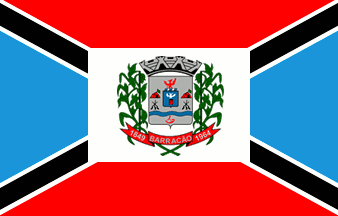 image by Dirk Schönberger,
3
January 2012
image by Dirk Schönberger,
3
January 2012Source: http://www.barracaors.com.br/simbolos_do_municipio.php

Last modified: 2012-02-10 by ian macdonald
Keywords: rio grande do sul | barracão |
Links: FOTW homepage |
search |
disclaimer and copyright |
write us |
mirrors
 image by Dirk Schönberger,
3
January 2012
image by Dirk Schönberger,
3
January 2012
Source:
http://www.barracaors.com.br/simbolos_do_municipio.php
A black saltire, bordered white, on a field divided red above and below, and blue to hoist and fly, with the municipal arms centred in a white rectangle.
Official website at http://www.barracaors.com.br
Dirk Schönberger,
3 January 2012
The municipality of Barracão (9,027 inhabitants in 2007; 516.3 sq. km) is
located 370 km of Porto Alegre, in north-western Rio Grande do Sul, on the
border with Santa Catarina state, here the River Uruguai.
Barracão was first
settled by gauchos from the São Paulo Province who wanted to escape the Santa
Vitôria tax administration. They crossed River Uruguay on a ford known as the
Pontoon Step. In 1848, the Provincial government was made aware that the
gauchos illegally used the step and commissioned Captain Joaquim Antonio de
Moraes Dutra to build a shed as the seat of the tax collectors. The village
that developed around the shed (Portuguese, "barracão") was named Barracão.
In 1849-1856, the Barracão shed was the most efficient tax collecting place
in the province. The municipality of Barracão was created on 30 May 1964 by
State Law No. 4,732 and inaugurated on 7 February 1965. Its territory, taken
from the municipalities of Lagoa Vermelha and São José do Ouro, is made of
the two Districts of Barracão and Espigãão Alto.
http://www.barracaors.com.br/historico.php - Municipal website
The flag
is described on the municipal website as follows:
"On the flag, the coat
of arms represents the Municipal Government while the white rectangle framing
it represents the two proper, as the seat of the Municipality. White is a
symbol of peace, friendship, work, prosperity, purity and religious feeling.
The white stripes filled in black [the black stripes fimbriated in white]
that quarters the flag represents the influence of the municipal power, which
spreads to all parts of the territory. Black is a symbol of austerity,
prudence, wisdom, moderation and firmness. The flag's quarters are in turn
blue and red, representing the rural estates located on the municipal
territory. Blue is a symbol of justice, nobleness, perseverance, zeal and
loyalty. Red symbolizes commitment, patriotic love, audacity, intrepidity,
courage and valiance."
The flag is hoisted in front of the town hall.
http://www.barracaors.com.br/fotos_g/cidade/P1010102.jpg - Photo, flag
partially visible
The municipal symbols are provisioned in the Municipal
Organic Law No. 674 of 7 February 1990, as "a flag, a coat of arms and an
anthem, representative of its culture and history". They are not further
described, however.
http://www.barracaors.com.br/arq_site/imagens/lei_organica_municipio.pdf
Ivan Sache, 6 January 2012